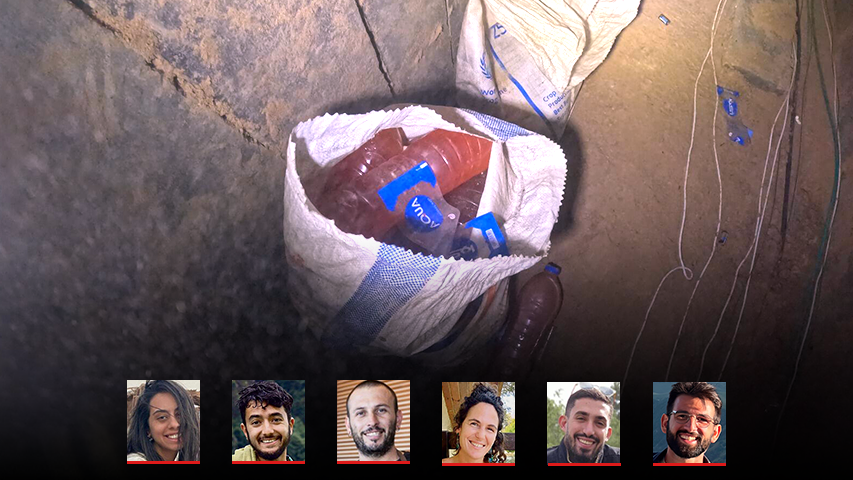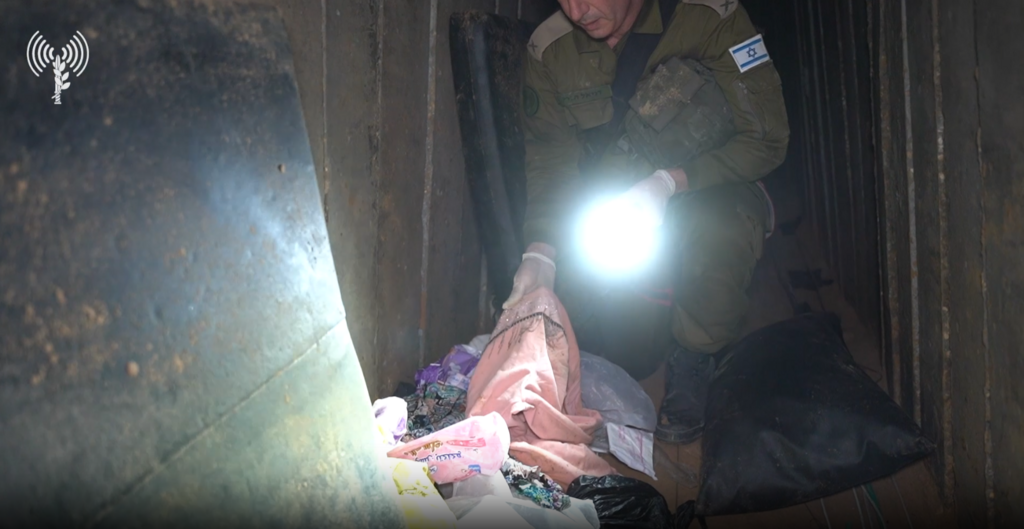Getting your Trinity Audio player ready...
Gaza tunnel where six hostages held captive and executed
(Video: IDF Spokesperson's Unit)
The IDF has released harrowing footage from a tunnel in Gaza where six Israeli hostages—Karmel Gat, Eden Yerushalmi, Ori Danino, Almog Sarusi, Hersh Goldberg-Polin and Alex Lobanov—were held before being executed by Hamas.
IDF Spokesperson Rear Adm. Daniel Hagari revealed the video after a camera crew descended into the grim scene, entering from a child's bedroom with Mickey Mouse drawings on the walls.
2 View gallery


Gaza tunnel where six hostages held captive and executed
(Photo: IDF Spokesperson's Unit)
The crew ventured 394 feet (120 meters) into a tunnel shaft, where they found rags believed to have been used by the hostages, bottles filled with urine and a broken hairbrush—heartbreaking remnants of the victims' captivity.
You can't help but think about the immense human suffering in this dark, suffocating place, where someone brushed their hair for days and months trying to preserve some semblance of humanity. "We distributed it in English," Hagari said, "so that the world will see, know and remember the evil of Hamas."
I thought about what my mother, who survived the Holocaust, would have said about expecting the world to not only know, but to remember. To know and remember how Eden Yerushalmi, a 24-year-old woman, with the weight of a child, just 36 kilograms (79 lbs.), not much more than my mother weighed when she came out of the Nazi death camp.
2 View gallery


The tunnel where hostages were held and executed in Gaza
(Photo: IDF Spokesperson's Unit)
It is not just the failure of Israel to tell its story. It is that world that for the most part has turned its back on us soon after the terrible massacre on October 7, and all the victims who were murdered, raped, burned and tortured.
There are justifications, explanations and ideologies galore about Israeli "colonialism", "apartheid" and "occupation" used to justify the world's silence and indifference and its choice to conflate victims and aggressors.
There are even collaborators within us who accuse the IDF of war crimes and starvation but say nothing of those who were raped, tortured, shot or still held in captivity nearly a year on, buried in a hell that only the tip of it was seen by us and the camera crew.
 Ariela Ringel Hoffman Photo: Shalom Bar-Tal
Ariela Ringel Hoffman Photo: Shalom Bar-TalIsrael's conduct is not without its faults. There were things that should not have been done. There are those in leadership who did not fulfill their duties.
But this tunnel, which is no more than shoulders wide, stained with blood and where bodies were found, tells a story that sends us back 85 years to the same voices and the same silence from the world.
So, what if the world sees, knows and remembers, as Hagari had hoped? If it sees, will it know? And if it knows, will it remember? And if it remembers? Then what?





